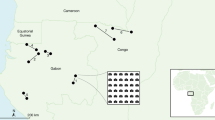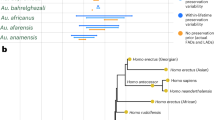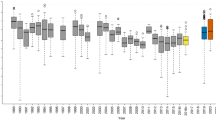Abstract
The long life and large size of trees make it unrealistic to use conventional methods of plant biology in the study of their populations1. However, detailed radiocarbon-dated pollen diagrams offer the opportunity for observing the behaviour of tree populations over long periods of time (102–104 yr) and to compare phases of expansion with simple mathematical models of population growth2. This produces information concerning tree populations which could not otherwise be collected. I report here a pollen-analytical study of the expansion of several tree taxa in the early and mid-postglacial of Norfolk, UK. Exponential and logistic growth models applied to the phases of expansion of these taxa show that their populations double every 35–175 yr.
This is a preview of subscription content, access via your institution
Access options
Subscribe to this journal
Receive 51 print issues and online access
$199.00 per year
only $3.90 per issue
Buy this article
- Purchase on Springer Link
- Instant access to full article PDF
Prices may be subject to local taxes which are calculated during checkout
Similar content being viewed by others
References
Harper, J. L. Population Biology of Plants (Academic, London, 1977).
Watts, W. A. in Quaternary Plant Ecology (eds Birks, H. J. B. & West, R. G.) 195–206 (Blackwell, Oxford, 1973).
Mosby, J. E. G. Trans. Norfolk Norwich nat. Soc. 14, 61–67 (1935).
Godwin, H. & Tallantire, P. A. J. Ecol. 39, 285–307 (1951).
Sims, R. E. in Quaternary Plant Ecology (eds Birks, H. J. B. & West R. G.) 223–236 (Blackwell, Oxford, 1973).
Sims, R. E. in The Effects of Man on the Landscape: the Lowland Zone (eds Limbrey, S. & Evans, J. G.)57–62 (Council for British Archaeology Research Rep. 21 1978).
Bennett, K. D. thesis, Univ. of Cambridge (1982).
Stockmarr, J. Pollen Spores 13, 615–621 (1971).
Birks, H. J. B. & Birks, H. H. Quaternary Palaeoecology (Arnold, London, 1980).
Faegri, K. & Iversen, J. Textbook of Pollen Analysis 3rd edn (Blackwell, Oxford, 1975).
Huntley, B. & Birks, H. J. B. An Atlas of Past and Present Pollen Maps for Europe: 0–13000 years ago (Cambridge University Press, in the press).
Hutchinson, G. E. An Introduction to Population Ecology (Yale University Press, 1978).
Till, R. Statistical Methods for Earth Scientists (Macmillan, London, 1974).
Carlisle, A. & Brown, A. H. F. J. Ecol. 56, 269–307 (1968).
Jones, E. W. J. Ecol. 47, 169–222 (1959).
Longman, K. A. & Wareing, P. F. Nature 184, 2037–2038 (1959).
Wardle, P. J. Ecol. 49, 739–751 (1961).
Brown, J. & Nisbet, J. The Forester (Blackwood, London, 1894).
Rackham, O. Ancient Woodland (Arnold, London, 1980).
McVean, D. N. J. Ecol. 41, 447–466 (1953).
Molisch, H. Die Lebensdauer der Pflanze (Fischer, Jena, 1929).
Pigott, C. D. & Huntley, J. P. New Phytol. 81, 429–441 (1978).
Tsukada, M. Jap. J. Ecol. 32, 113–118 (1982).
Tsukada, M. Jap. J. Ecol. 32, 159–187 (1982).
Tsukada, M. Jap. J. Ecol. 31, 371–383 (1981).
Smith, A. G. Proc. R. Soc. B161, 331–342 (1965).
Author information
Authors and Affiliations
Rights and permissions
About this article
Cite this article
Bennett, K. Postglacial population expansion of forest trees in Norfolk, UK. Nature 303, 164–167 (1983). https://doi.org/10.1038/303164a0
Received:
Accepted:
Issue Date:
DOI: https://doi.org/10.1038/303164a0
This article is cited by
-
One hundred years of Quaternary pollen analysis 1916–2016
Vegetation History and Archaeobotany (2018)
-
Population dynamics and genetic changes of Picea abies in the South Carpathians revealed by pollen and ancient DNA analyses
BMC Evolutionary Biology (2011)
-
Regime shifts in a socio-ecological model of farmland abandonment
Landscape Ecology (2011)
-
Forest Conservation and CO2 Emissions: A Viable Approach
Environmental Modeling & Assessment (2011)
-
When no pollen does not mean no trees
Vegetation History and Archaeobotany (2006)
Comments
By submitting a comment you agree to abide by our Terms and Community Guidelines. If you find something abusive or that does not comply with our terms or guidelines please flag it as inappropriate.



